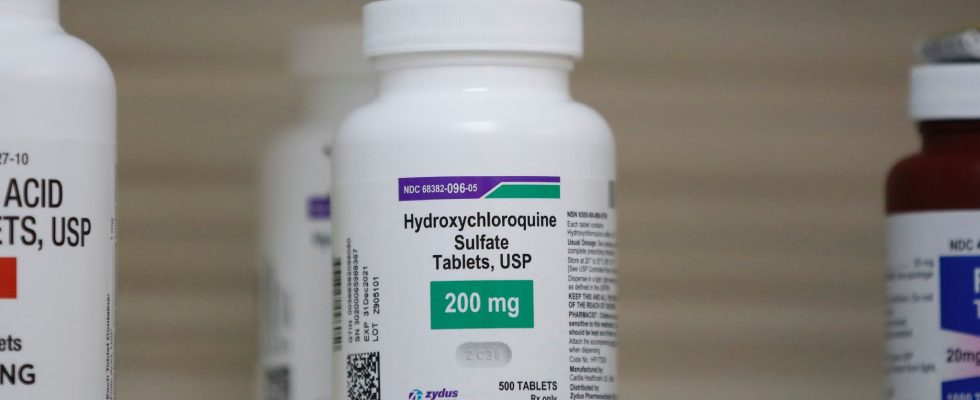In the scientific world, the question of the effectiveness of hydroxychloroquine against Covid-19 sometimes makes you smile. But more often than not, it annoys. The answer was decided more than two years ago now and is now a consensus: this drug, whether or not associated with other molecules, does not work against this disease. For the general public, on the other hand, the fact remains less obvious. An Ifop-FLASHS poll published Thursday, April 14 indicates that 21% of those questioned still think that a “chloroquine-based protocol” is effective against Covid-19 (51% are of the opposite opinion and 28% do not decide).
Admittedly, the popularity rating of this treatment has been falling since 2020, when another Ifop poll showed that 59% of respondents were in favor of it. “But 21% is still too high. This figure shows that part of the population is still misinformed or victim of misinformation”, regrets Mahmoud Zureik, professor of epidemiology and public health at the University Versailles Saint- Quentin. “These 21% reflect the weight of obscurantism in the face of the evidence of science”, abounds Professor Mathieu Molimard, head of the medical pharmacology department of the Bordeaux University Hospital.
Always prescribed treatment
If almost no researcher promotes hydroxychloroquine, a few diehards remain, the most zealous of whom are at the IHU in Marseille. On Tuesday April 4, the Marseilles institute once again released a study (which has not yet been officially published and has therefore not been re-read or peer-reviewed) supposed to demonstrate the effectiveness of the molecule. And once again, the document came under heavy fire from many specialists denouncing the methodological weaknesses of this work. Two days later, the former director of the IHU Didier Raoult published his autobiography (ed. Michel Lafon), in which he claims to have been “well and truly right” concerning hydroxychloroquine. He assures that the multiple studies proving him wrong are “biased”, and that the scientists who criticize him are actually “politics on television sets in Paris”. Also on April 6, he nevertheless went himself to the set of Do not touch My TV (in the Paris region) to promote his work and his science…
Faced with these new media offensives, the National Agency for the Safety of Medicines and Health Products (ANSM) published two press releases, Wednesday April 5, in which it recalls – for the umpteenth time – that hydroxychloroquine, whether or not associated to azithromycin, is ineffective in the treatment of Covid-19. However, doctors continue to prescribe it, especially in Provence-Alpes-Côte d’Azur and Occitanie. In the study published on April 4, the IHU also acknowledges having continued its protocol until at least December 2021. Hydroxychloroquine, which had benefited from a temporary exemption at the start of the Covid 2020 crisis, no longer has authorization for placing on the market (AMM) for Covid-19 since May 26, 2020. In other words, this molecule should normally no longer be prescribed to treat Covid since this date, except in exceptional and strictly supervised cases. Quite logically, it is therefore no longer reimbursed.
The agency therefore had to recall that these medicines can cause potentially dangerous side effects, such as heart rhythm disturbances or an increased risk of fetal malformations. She adds that these prescriptions can represent a loss of opportunity for patients by delaying the use of other effective treatments. This position, shared by the health authorities of the European Union, but also by the World Health Organization (WHO), is solidly documented. The scientific production on this subject is particularly rich and includes dozens of randomized controlled studies – the gold standard in this field – methodically robust observational studies, as well as meta analyzes (which bring together the conclusions of numerous studies). These various publications have made it possible to determine that the prescription of hydroxychloroquine is useless in prevention – it does not reduce the risk of infection -, but also at the start of the infection or in the event of serious forms.
Many sources available
The results are easily searchable, since there are many reliable and quality sources of popular science, such as the website of the French Society of Pharmacology and Therapeutics (SFPT). The latter notably offers a summary of the conclusions of the most relevant studies on the subject as well as links allowing them to be consulted in detail. “The available data suggest that chloroquine or hydroxychloroquine used in combination with azithromycin are not clinically effective in treating Covid-19, nor in preventing infection in subjects at risk. Concerning hydroxychloroquine used alone , more than 300 studies have emerged, but only 35 trials were randomized and controlled. Among them, only 9 relate to a workforce of more than 100 patients”, indicates for example the SFPT.
The scholarly society also offers a critical analysis of the most significant studies, and refers to valuable resources, including the website of the Covid-NMA projectsupported by AP-HP and the Cochrane collaboration, or the project meta-evidence.org, supported by the University and the University Hospital of Lyon. These two websites allow you to consult, in the blink of an eye, the results of studies carried out on hydroxychloroquine alone, in combination with azithromycin, zinc or even lopinavir, then to check their methodological and statistical soundness and therefore the level of trust that can be granted to them, etc. They also list the meta analyzes and regularly update their results with the most recent data. These sites also offer the same type of information on the main drugs and vaccines tested against Covid-19.
“Fortunately, the value of hydroxychloroquine – or other treatments – is not based on the results of a survey, notes Prof. Molimard. Moreover, at one time, the majority of people thought that the Earth was flat, which didn’t make it true.” The scientific consensus on the ineffectiveness of hydroxychloroquine is not likely to change in the future. But like the belief in the flat Earth, the belief in the effectiveness of the “Raoult protocol” could also persist for some time.
